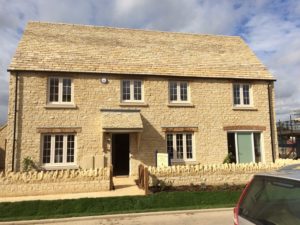 Low maintenance costs combined with a traditional appearance persuaded a social housing provider to join forces with a private developer in pressing for planners to approve the Modus flush casement PVC-U window system from Eurocell in preference to timber.
Low maintenance costs combined with a traditional appearance persuaded a social housing provider to join forces with a private developer in pressing for planners to approve the Modus flush casement PVC-U window system from Eurocell in preference to timber.
Gloucester City Homes (GCH) has a total of 20 one, two and three bed-roomed homes on the Bentham Green development being built by Lioncourt Homes under a Section 106 agreement (based on that section of the 1990 Town & Country Planning Act), with half to be rented while half will be in shared ownership.
The estate is in an Area of Outstanding Natural Beauty that comes under the jurisdiction of Tewkesbury Borough Council’s planning department, which uses the Cotswold Design Code as its reference, so the planners were insistent that flush casement timber windows should be fitted.
“We don’t want to create a financial burden in the long run for our shared ownership residents, so these windows made sense. The organisation is responsible for the future maintenance of the 10 affordable rent units so this product will save the organisation money in the long run. They’re very attractive, they have a very long life span and they don’t require much maintenance. We felt the product was of high quality and a very strong offer”. said Kelly Thomas, Development Manager for GCH.
“This window has a high proportion of recycled material so it’s environmentally okay, or that would have been an issue, but we saw no reason to fight for the wooden version,” she added.
Similar issues pre-occupied Lioncourt Homes, which felt that timber windows would compromise its reputation for building homes that were with few maintenance needs.
“We stand out by being different through our quality. This is demonstrated by the fact that we are only one of 15 housebuilders to be awarded the 5 Star quality rating in the annual Home Builders Federation customer satisfaction survey for the three consecutive years,” explains commercial director Matt Underwood.
“We are always looking to explore alternative products and materials that enhance the quality and reduce the maintenance costs of our homes which is why the Modus PVC-U window system stood out to us as a great alternative to timber windows.”
Lioncourt contacted Eurocell – the UK’s leading manufacturer, distributor and recycler of window, door, conservatory and roofline products – which introduced it to the Modus range and to A&B Glass, the Tewkesbury-based fabricator and installer. Together they approached the planning authorities with samples and with photographs of similar developments where timber windows had been fitted to meet planning requirements but had been replaced with inappropriate aluminium and PVC-U equivalents within months.
“Planners don’t appreciate how far PVC-U products have come on in the last decade and what an improvement they are upon timber,” commented Matt Sollis of A&B Glass. “And the first-time householders see all the costs of stripping back and repainting timber windows they will consider replacing them.”
Coming with a 12-year guarantee, the Modus system is available in nine solid and woodgrain-effect colours, all of which are available with white internal finishes to create a light and airy living environment. A further range of more than 40 solid and woodgrain effect finishes is available, including colour both sides.
BBA certified to function satisfactorily for more than 35 years, the Modus range has a U-value of 1.2 W/m² using 4/20/4 mm sealed double-glazed units. This effective thermal performance is due to the 75mm six-chamber profile system used in the Modus that enables the range to achieve a U-value as low as 0.7 by installing triple-glazed units. This led to Modus becoming one of the very first systems to achieve the BRFC Window Energy Rating (WER) of A++. This is only awarded to windows with an energy index value equal to or greater than +20; and Modus A++ designs include casement, reversible and tilt and turn.
Consisting of 50% post-consumer recycled PVC-U as standard, this range of doors and windows has a smaller carbon footprint than products made or recycled outside of the UK. Eurocell achieves this by employing dual material extrusion technology (DMET) that layers post-consumer recycled and ‘virgin’ material simultaneously, so the recycled material is concentrated in the central core of the profiles where it cannot be seen once the door or window is installed.
To simplify specification, Modus BIM models are available to download for free from the Eurocell website at visit: http://www.eurocell.co.uk/bim

